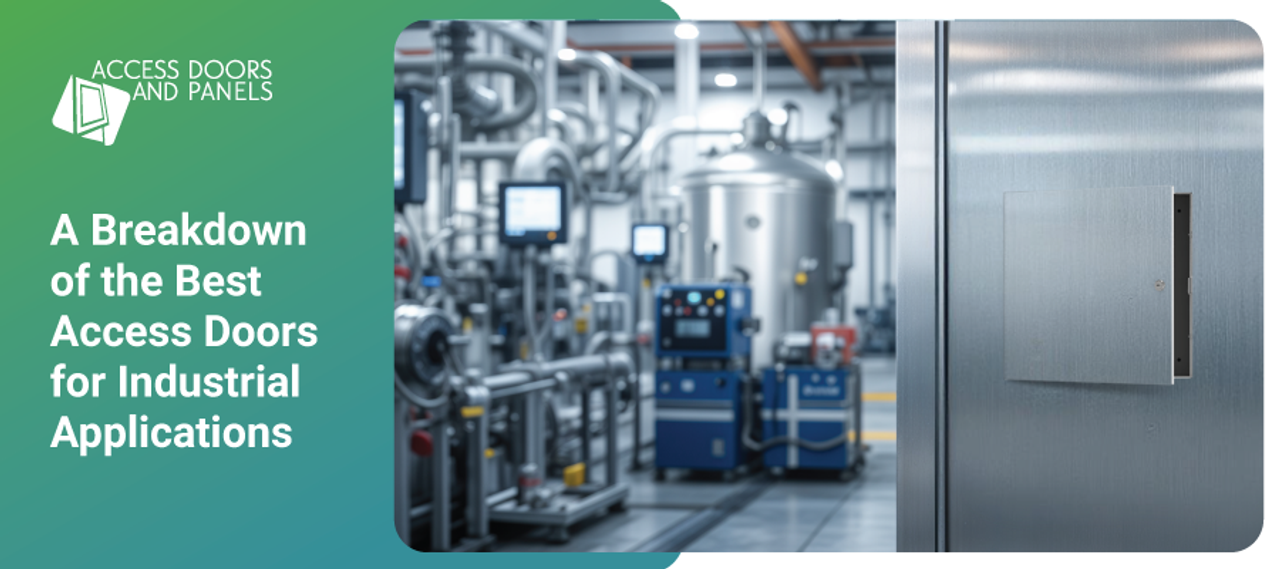A Breakdown of the Best Access Doors for Industrial Applications
Posted by Access Doors and Panels on 20th Nov 2024
Access doors are essential in industrial operations, ensuring effective maintenance, safety, and facility function. They play a crucial role in protecting personnel and equipment during routine inspections and emergencies.
The Importance of Access Doors in Industrial Facilities
Besides serving as entry points, industrial access doors offer significant contributions to the following aspects:
- Maintenance and Inspection: Routine maintenance is crucial for equipment health. Access doors provide easy access to machinery, utilities, and critical components.
- Emergency Egress: In the event of unforeseen circumstances, certain access doors, like roof hatches, serve as vital escape routes, ensuring the safety of personnel.
- Ventilation and Air Circulation: Proper ventilation is essential for a healthy workplace. Some access doors are integral to promoting airflow, ensuring proper ventilation, and preventing the accumulation of harmful gases or pollutants.
- Security and Access Control: Specialized access doors with advanced security features can safeguard sensitive areas and prevent unauthorized access to protect valuable assets.
Types of Industrial Access Doors
1. General purpose access panels, often made of steel, aluminum, or plastic, are crucial for inspecting, maintaining, or accessing smaller components within industrial facilities. They are also essential for the upkeep of rooftop infrastructure, such as solar panels, communication antennas, or HVAC units.
HVAC access doors, in particular, are designed to provide easy and efficient access to heating, ventilation, and air conditioning (HVAC) systems. They are made of durable materials like steel or aluminum and have features that ease maintenance and inspection.
2. Roof hatch doors are designed to provide access to rooftop equipment, such as HVAC units, solar panels, or communication antennas. These doors are constructed from durable materials like steel or aluminum, making them essential for maintenance, inspections, and emergency access to rooftop infrastructure.
3. Floor access doors are vital for accessing underground utilities like pipes, cables, and conduits. These doors are made from sturdy steel or cast iron, making them crucial for the upkeep, repair, and inspection of underground systems.
4. Security doors provide enhanced protection for sensitive areas or restricted zones. With their reinforced frames, tamper-resistant locks, and panic bars, these doors offer unparalleled security for valuable assets. Security doors are perfect for secure environments like data centers and server rooms.
Real-World Applications of Access Doors
Access doors are vital in various industrial facilities, ensuring efficient operations, safety, and maintenance. Here are some real-world examples:
- Manufacturing Plants: Access doors are essential for maintaining and inspecting production equipment, ensuring optimal efficiency and safety. Access panels are ideal for inspecting machinery in food processing plants. In contrast, walk-in doors provide access to loading areas.
- Data Centers: Security doors are critical in protecting sensitive data and equipment. These doors incorporate advanced security measures to prevent unauthorized entry.
- Pharmaceutical Facilities: In pharmaceutical manufacturing facilities, access doors control access to clean rooms and other critical areas. These doors are often equipped with air curtains, interlocks, and decontamination systems to maintain a sterile environment.
- Power Plants: Access doors are essential for maintaining and inspecting power generation equipment, ensuring reliable and safe operation. For example, walk-in doors can access turbine rooms, while small access panels inspect control systems.
Key Factors to Consider When Selecting Industrial Access Doors
- Application: Determine the specific purpose of the access door to ensure that it meets the required functionality.
- Safety Standards: Focus on safety by following industry standards and regulations. Ensure the doors follow relevant safety regulations and standards, such as those set by NFPA and OSHA, to protect personnel and equipment."
- Environmental Conditions: Account for the environmental influences on the doors, including temperature, humidity, and corrosion.
- Load Capacity: If the doors are used for heavy equipment or materials, ensure they can withstand the required load.
- Security Requirements: If security is a primary concern, choose doors with appropriate security features, such as reinforced frames, tamper-resistant locks, or access control systems.
- Accessibility: Ensure the doors are accessible to all personnel, including those with disabilities, and comply with relevant accessibility standards.
- Maintenance Requirements: Check the maintainability and cost-benefit ratio of the doors.
Recommended Products
For those seeking high-quality access doors for industrial applications, consider the following products:
- BA-MSD Medium Security Drywall Access Panel: This panel offers a secure and discreet solution for accessing concealed spaces within walls.
- BA-SRH Roof Hatch for Security: This roof hatch provides secure and reliable access to rooftop equipment.
Conclusion
Access doors are crucial for industrial facilities, granting access to vital areas and ensuring smooth operations. Empower yourself by evaluating the factors outlined in this guide to choose the most suitable doors for your requirements, enhancing the safety and productivity of your industrial operations.
Contact Access Doors and Panels today at (800) 609-2917 or request a quote online to elevate your commercial space with our innovative access doors. Unlock the potential of enhanced accessibility, improved energy efficiency, and elevated design.

